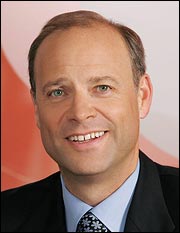 Swiss billionaire Ernesto Bertarelli has a number of fond memories about the Boston area. And one of his fondest revolves around the time spent learning how to sail in Plymouth Bay, where the Gurnet Lighthouse has helped keep ships off the rocks for 247 years. So when he set out to create a $2 billion biotech fund--announcing today that ex-Sanofi ($SNY) CEO Chris Viehbacher would be put in charge--Gurnet Point seemed like a good name for an investment group that was setting out to guide life sciences companies on a hopefully profitable journey.
Swiss billionaire Ernesto Bertarelli has a number of fond memories about the Boston area. And one of his fondest revolves around the time spent learning how to sail in Plymouth Bay, where the Gurnet Lighthouse has helped keep ships off the rocks for 247 years. So when he set out to create a $2 billion biotech fund--announcing today that ex-Sanofi ($SNY) CEO Chris Viehbacher would be put in charge--Gurnet Point seemed like a good name for an investment group that was setting out to guide life sciences companies on a hopefully profitable journey.
 |
| Chris Viehbacher |
"We've known each other for a number of years," Viehbacher says about his solo investor in an interview with FierceBiotech.
After decades in the corporate world, he adds, it's a good time to switch focus. Over the past 18 months or so, Viehbacher has been roaming the thriving Cambridge/Boston hub, "hanging out with VCs and biotechs." And the chance to reflect over the past 8 months since he left Sanofi has given Viehbacher time to shape his thoughts on the changing biotech world.
Not long ago, Viehbacher sat down with Bertarelli--who made a fortune on the sale of Serono--to pursue a conversation that many people fantasize about but very, very few experience. The subject: "If I had $2 billion to invest, this is how you do it."
It was an opportunity to think big, and when Viehbacher is finished, he wants nothing less than to be present at the creation of a new model in drug development. The old one has been evolving fast, he says. And a lot's changed over just the last 18 to 24 months.
"There's a ton of money flowing into the streets of biotech these days," he says. "Having capital is important, but it's not enough."
Companies that a few years ago would have been forced to look for near-term liquidity events--be it a licensing deal or a buyout--now have access to big pools of capital that allow them to keep their molecules longer than ever before. At the same time, many of these new players in the game also have multidisciplinary platforms. Companies like Moderna, Alnylam ($ALNY), Regulus ($RGLS) and Blueprint ($BPMC), or pioneers in the microbiome space, can decide for themselves where they want to partner and where they want to build niche pipelines of their own. And in that mix Viehbacher says that it's possible to see investment opportunities that could pay off for Gurnet.
To be sure, Viehbacher hedges a bit when he talks about Gurnet's investment strategy. It's early yet, and he adds that in the near future he'll be taking the wraps off a new deal that will help illuminate the path he's blazing now.
Viehbacher is clear, though, that Gurnet will be founding companies as well as looking outside the red-hot fields like oncology. To find value these days, you have to look outside of the trendiest fields, he says. And you're also not going to find much in the way of innovation at huge companies like Sanofi.
"My conclusion is that you can't have truly disruptive thinking inside big organizations," says Viehbacher. "Everything about the way a big organization is designed is about eliminating disruption."
In Viehbacher's view, Big Pharma is still trying to act in the way the old movie studios once operated in Hollywood, with everyone from the stars to writers and stunt men all roped into one big group. Today, he says, movie studios move from project to project, and virtually everyone is a freelancer. In biopharma, he adds, value is found in specializing, and "fixed costs are your enemy."
"Nobody should be ashamed that they don't manage absolutely everything," he says. "You're going to see our industry become more like the movie industry."
And that's a trend that Gurnet, Chris Viehbacher and his solo investor Ernesto Bertarelli plan to play a big role in. -- John Carroll (email | Twitter)